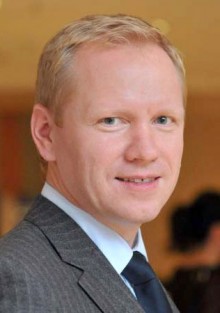The EU has refused to apply greater economic pressure to Russia to stop its military aggression in eastern Ukraine. The reason for the delay is the need to see how the Minsk agreements are observed. What is happening, according to many Ukrainians, is a show of almost complete disregard for the conditions set out in them. Why is Europe procrastinating, then? Does the EU understand that the lack of an adequate response to the aggressor only increases the risk of the military conflict spreading far beyond Ukraine? Will the West help rebuild the destroyed eastern regions of Ukraine, and how will it do it? We asked these and some other questions in an exclusive interview, held on the sidelines of the roundtable “Ukraine in Europe: Peace and Development” in Vienna with a co-organizer of the event, head of the German-Ukrainian Forum, executive director of the Committee on Eastern European Economic Relations, a former foreign policy adviser to the German government and the Bundestag at the German Institute for International and Security Affairs Rainer LINDNER.
Recently, President of Lithuania Dalia Grybauskaite said in an interview with American newspaper Washington Post that Petro Poroshenko was forced into assenting to the Minsk agreement by the EU, although some of the proposed conditions were unacceptable for Ukraine. As a result, our country has been left virtually on its own in negotiations with Russia, and the EU has become an observer, aiming primarily to keep the armed conflict local and prevent it spreading to the EU’s territory. It seems that Europe has fooled Ukraine. Do you agree?
“No, I do not. All EU’s actions over the recent months were in favor of Ukraine, or at least they were designed with Ukraine’s interests in mind, including financial support, policy advice, and the simultaneous ratification of the EU-Ukraine FTA by Ukrainian and European parliaments. Unfortunately, the EU and Germany were very late to start engaging in Ukraine (it happened only at the beginning of the FTA talks). We had lost a lot of time before the military conflict. We had to deal with Ukraine much earlier and in a more strategic manner.
“As for the current situation, all EU governments have excluded a military solution to the conflict and military implications from their options. Arms transfers have been ruled out so far as well, but the debate on this issue continues within the EU as well as in the US and NATO. The result of this debate is difficult to predict.”
Can you explain why the EU does not impose harsh economic sanctions against Russia (the C-level sanctions)? After all, they can stop the military aggression for real.
“A number of economic sanctions are in force already, despite our initial unwillingness to go down that path at all. We have already imposed three levels of sanctions. There are countries that would like the union to take more stringent action.”
What is stopping the EU from doing so, then?
“It is obvious that different member states have different interests in this regard. It is not just business interests. One’s level of bilateral relations with Russia matters as well... Further developments depend on Russia: how constructive will it be, what steps will it take.”
If, God forbid, a full-scale Russian military intervention in Ukraine happens, do you think the EU will impose sanctions on the energy sector?
“I do not think that Germany, the EU, and Russia will take action in the energy sector. There are countries like Serbia, Bulgaria, Finland, which are dependent on Russian gas [making for over 30 percent of the EU’s total gas supply. – Author] even more than we [Germany. – Author] are. We are unable to replace these volumes before the onset of winter. Therefore, I do not think that the energy sector will be subjected to the EU sanctions on Russia any time soon.”
How much financial support is the EU ready to provide for the reconstruction of Ukraine in general and its eastern regions in particular?
“The EU has promised 11 billion euros. It is a significant amount which, however, may prove to be too low for stabilization.”
What projects can be implemented?
“Firstly, the Committee on Eastern European Economic Relations has proposed programs to support young managers from Ukraine for our government. In particular, we are actively inviting them to take internships in German companies, with scholarships provided by our side. Secondly, we are developing a concept for the modernization of housing services and preparing pilot projects on it. Such a project to modernize the industry has already begun in the town of Zhovkva. As for the east of Ukraine, it is hard to say at the moment. The amount of funding will depend on the level of modernization. After the crisis ends, we will attract German companies to Ukraine, to help it reconstruct damaged infrastructure.”







